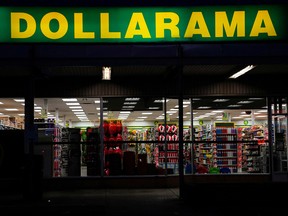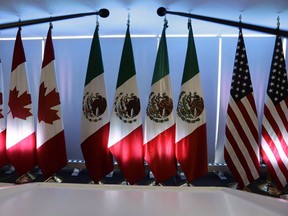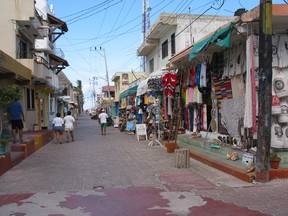‘Chili-cucumber flavoured gummies’: PesoRama’s product offering is tailor-made for the Mexican market

Article content
At their vacation home in Mexico in 2016, Toronto businessman Rahim Bhaloo and his wife were getting ready to attend a birthday party when they realized they didn’t have a gift bag for the present.
Advertisement 2
Article content
Back home, there’d be a simple solution: pop out to one of Dollarama Inc.’s 100 stores in Canada’s biggest city. But, as Bhaloo would soon discover, it wasn’t that simple in Mexico. He drove all over Playa del Carmen looking for a dollar store and couldn’t find one. He said it took him more than three hours to find the bag, which cost him 55 pesos, or the equivalent of about $3, more than twice as much as what Dollarama charges.
Article content
When Bhaloo finally got back to the house, he tossed the bag on the counter and an argument ensued. How could it have taken him so long? His wife paused and said, “Rahim, don’t you think there’s an opportunity for dollar stores in Mexico?”
Bhaloo, formerly the country’s largest Second Cup Coffee franchisee, balked at the suggestion. “I don’t know the market,” he said.
Advertisement 3
Article content
He wasn’t the first Canadian entrepreneur to hesitate to set up in Mexico. Even though Canada and Mexico had been trading partners since 1994 thanks to the North American Free Trade Agreement (NAFTA), Canadian entrepreneurs and executives have tended to prefer do business in the United States. In 2000, exports to the U.S. accounted for about 87 per cent of Canada’s total exports, while exports to the U.S. accounted for about 88 per cent of Mexico’s total.
Foreign investment numbers were not much better. Canadian foreign direct investment in Mexico totalled just $3.9 billion CAD in 2000. But that might be changing. Today, Canadian investment via ventures such as PesoRama total $25 billion per year, driven by the country’s growing middle class and competitive labour costs, according to Global Affairs Canada.
Advertisement 4
Article content

Historically, the allure of the U.S. market has discouraged Canadian businesses from making meaningful trade connections elsewhere, business executive and former financial journalist Andrea Mandel-Campbell said in her 2007 book Why Mexicans Don’t Drink Molson. “Canadian ‘trade’ rarely ventures beyond the cozy confines of the northern United States,” she wrote. “When it comes to the rest of the world, Canadians are armchair travellers, rarely roused from the familiar contours of the ‘intramestic’ American market to seek their fortune in foreign lands.”
She then quoted Carin Holroyd, professor of political science at the University of Saskatchewan: “‘We’ve had it easy. We’ve got lots of resources that we could sell easily to a market that spoke English and was close by,’” Holroyd said. “‘We haven’t had to work very hard.’”
Advertisement 5
Article content
For Bhaloo, the idea of exploiting a market failure in Mexico was intriguing. In 2018, he began researching and realized that Canada — which had a population of 37 million people and a per capita income of US$46,548 at the time, according to World Bank figures — was home to hundreds of Dollaramas, while Mexico, with a population of 126 million people and a per-capita income of US$9,687, had virtually none.
Mexico’s poorer households arguably were in greater need of ultra-low-cost retail than Canada, yet nobody had stepped up to the plate. Bhaloo came out of early retirement from the coffee business to create PesoRama Inc., which today calls itself “the first significant” true dollar store chain in Mexico, with 20 stores in Mexico City.
Advertisement 6
Article content
‘It just would not happen’
The PesoRama team quickly learned why dollar stores were few and far between in Mexico. On a phone call, chief executive Erica Fattore said that everything from importing goods, to hiring, to day-to-day operations was more difficult in Mexico. Businesses must “build an infrastructure specifically for Mexico,” Fattore said. “It’s not like you can roll out an existing infrastructure from the U.S. into Mexico. Or from Canada into Mexico. It just would not happen.”
If Canadian businesses can overcome these difficulties, it could be worth their while. Mexico is the second-largest economy in Latin America after Brazil, and among the 15 largest economies in the world. Over half a million Canadians visited Mexico in 2021, and many Canadian retirees, Bhaloo among them, have bought property there.
Advertisement 7
Article content
Mexico has more to offer than beaches: it’s one of the emerging countries most open to foreign direct investment, boasting 13 trade agreements, which is nearly on par with Canada’s 15. The most recent World Investment Report issued by the United Nations Conference on Trade and Development (UNCTAD), lists Mexico as one of the 10 biggest destinations for FDI in 2021. Today, Canada and Mexico share $41.7 billion in two-way merchandise trade annually, making Mexico Canada’s third largest merchandise trading partner, behind the U.S. and China.

To be sure, Mexico’s growth has slowed in recent years. The country is struggling with the fastest inflation in two decades, according to the International Monetary Fund. It is possible that the Mexican economy may continue to suffer from the ripple effects of the pandemic, exacerbating “long-standing problems of low growth and high inequality,” said the IMF. However, Mexico is prepared to manage this “turbulent” environment, given its strong macroeconomic, monetary, and fiscal policy, said the IMF in its most recent Article IV report on Mexico.
Advertisement 8
Article content
Juan Navarro, director and principal researcher of CMX Partnerships, a company which conducts trade and investment studies, wrote in an email, “While it is true that the Mexican government and the overall society has much work (to do) regarding decreasing the rate of crime, the country has made many improvements during the last years.”
He added, “Canadian companies should seriously consider investing in Mexico because of its reliable and long-lasting partnership with Canada and because Mexico is a country committed to international trade, investments and the rule of law.”
‘Get to know the people’
Mexico is a largely untapped market for the “value retail” industry, said Fattore, who has been working in dollar store management for two decades.
Advertisement 9
Article content
“One of the things that I would really like people to know is that it’s a great market with lots of opportunity,” Fattore said. “When we came into Mexico, the one thing that was very apparent to me is that everybody just wants to do business.”
Canadian businesses and investors often have misconceptions about trading with Mexico, she said. When people think about the country, two things come to mind: resorts, and a tricky political climate, she added.
And for good reason. Organized crime and corruption hurt the business climate in Mexico, analysts from Banco Santander S.A. reported. According to Human Rights Watch, Mexico routinely grapples with human rights violations, including torture, gender-based violence, and enforced disappearances. Meanwhile, President López Obrador has expanded the use of armed forces to control immigration, run social programs, and pursue large projects. Impunity is common in the Mexican criminal justice system.
Advertisement 10
Article content

Still, Mexico isn’t a failed state, overrun by disorder. By comparison, life in Canada is stable, but that doesn’t mean the barriers are insurmountable.
“There are, again, a lot of misconceptions,” said Fattore. “It’s important that everyone should come to their own sort of decisions by seeing it,” she continued. “I normally invite everyone to come down and take a look. Walk the stores, walk the neighbourhoods, get to know the people.”
PesoRama is not the only value retailer with an interest in the Latin American market. In 2019, Dollarama acquired a controlling stake in Dollarcity, which has stores in El Salvador, Guatemala, Columbia and Peru. Goodlettsville, Tenn.-based competitor Dollar General Corp. plans to expand into Mexico, opening 10 stores by 2023. (Since PesoRama opened in Mexico, its main competitor has been Waldo’s Dólar Mart de México, S. de R.L. de C.V., but that is set to change with the entry of Dollar General.)
Advertisement 11
Article content
Fattore said she isn’t concerned about the competition because international retailers tend to treat Mexico like an extension of their U.S. and Canadian operations, failing to recognize that even though Mexico is a North American country, Mexicans have very different tastes.
“They’re taking what they do so well for their existing market and they’re trying to drop it into Mexico,” she said. “Seeing Americana, red white and blue, doesn’t make sense. Seeing the St. Patrick’s Day product in Mexico… Guys. It just does not make sense.”
Chili cucumber gummies
PesoRama took a different approach, tailoring its offering to the Mexican market. For example, Mexicans prefer different candy flavours, colours, and drinks to Canadians and Americans, Fattore said. So PesoRama carries a chili cucumber-flavoured gummy, as well as other products Mexicans know and love.
Advertisement 12
Article content
Dollar stores don’t generally take steps to innovate, Fattore said, betting that low prices are enough to bring in clientele. But inflation, which Fattore calls the biggest challenge facing the dollar store industry today, has increased prices beyond the usual dollar-store threshold. “Now they’ve had to look at new strategies,” she said. “They’re all kind of waking up to this. ‘Oh my goodness, I don’t have that dollar price point to rely on anymore.’”
PesoRama followed the Dollarama pricing model, which starts with prices solely at $1 or below and increases over time. PesoRama started at 25 pesos and below and increased to 50 pesos and below. Now its products range from $1.50 to $3.15, or 25 to 50 pesos.
“The dollar store business is a supply-chain business,” said Bhaloo. “It’s all about being able to source product from the various parties.”
Advertisement 13
Article content
In order to keep prices low, dollar stores often choose to sell their own private label brands, which tend to be cheaper because the stores don’t need to negotiate with major companies. Sixty per cent of PesoRama’s inventory is private label, said Bhaloo.

What Mexican consumers want, more than anything, said Bhaloo, is value. He tested the PesoRama stores in eight different Mexican neighbourhoods with different income levels, and realized that “it doesn’t matter where (we) open,” Bhaloo said. “Whether it’s high income, lower income, or medium income, we cater to all market segments.”
With this in mind, the company plans to open five stores a month starting next month, in addition to their 20 existing stores. For the time being, Bhaloo plans to concentrate on Mexico, but he has bigger plans for the future of the company. “It’s a business model that works worldwide,” he said. “We just happen to be in a market where we are the first coming in, and we have the opportunity to have a first mover advantage.”
Advertisement 14
Article content
-

Loblaw faces accusations it dressed up routine practice as No Name price freeze
-

Canadian Tire’s break with Hockey Canada shows it’s no longer just a store for guys
-

Retailers call on Ottawa to implement GST rebate for tourists
Fattore believes the dollar store market is PesoRama’s for the taking. “I’d like to dominate this market,” she said.
PesoRama is cashing in on a trading relationship decades years in the making. Navarro advises other Canadian companies do the same. “I highly recommend Canadian companies (invest) in Mexico not only for the attractive business environment that Mexico offers in a broad range of industries, but also because Mexico is one of Canada’s long-time trading partners,” he said.
“Diplomatic relationships have existed among these two countries for almost 80 years, which are solid foundations for building capacity together (to the) benefit of their businesses.”
• Email: mcoulton@postmedia.com | Twitter: marisacoulton


